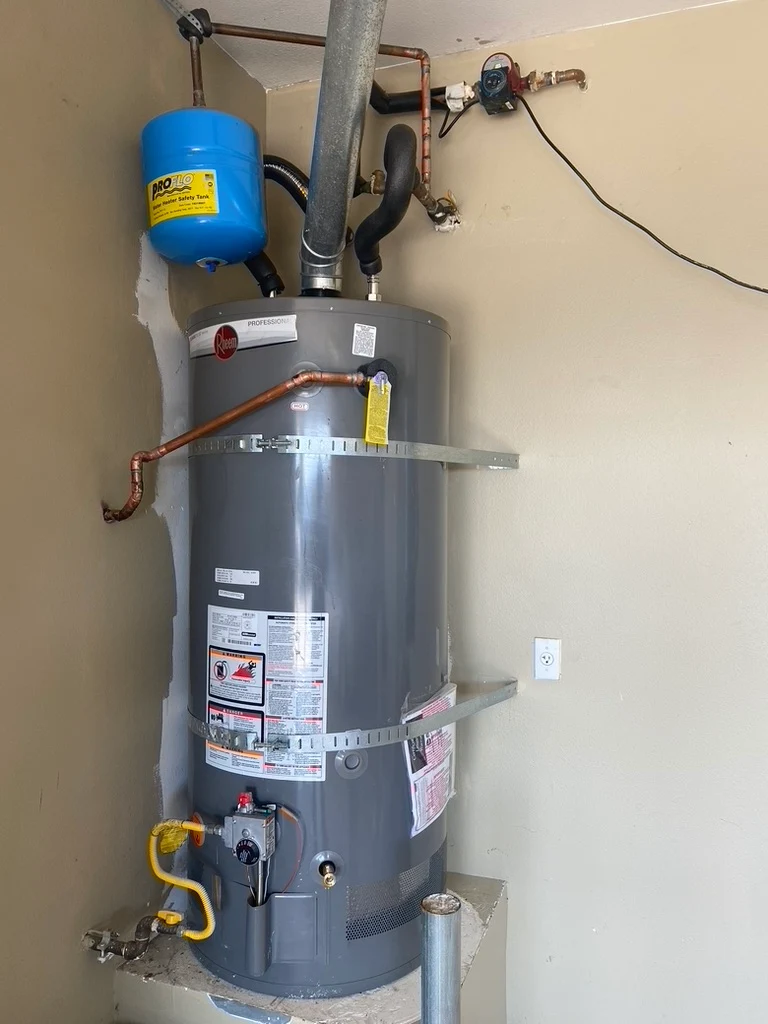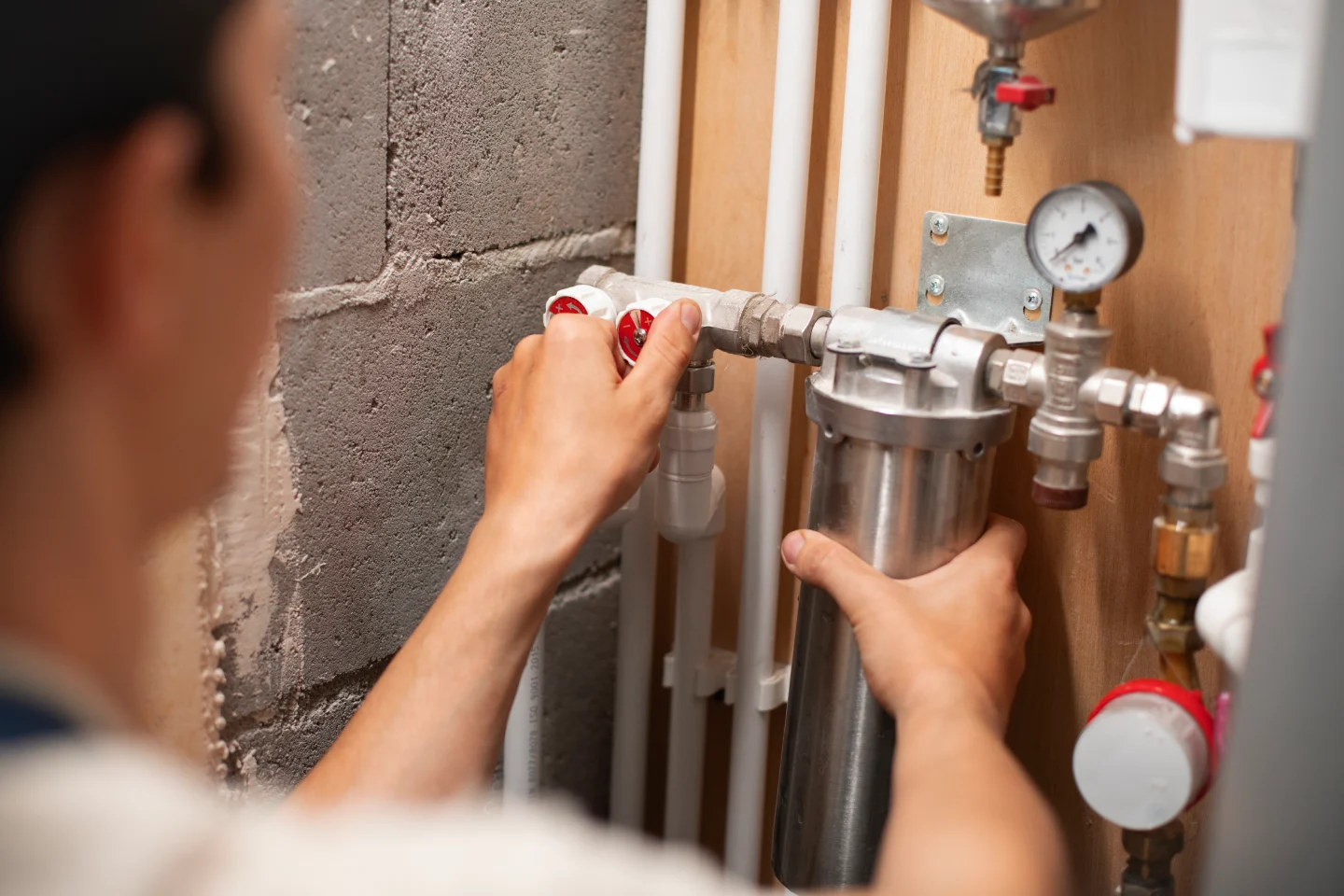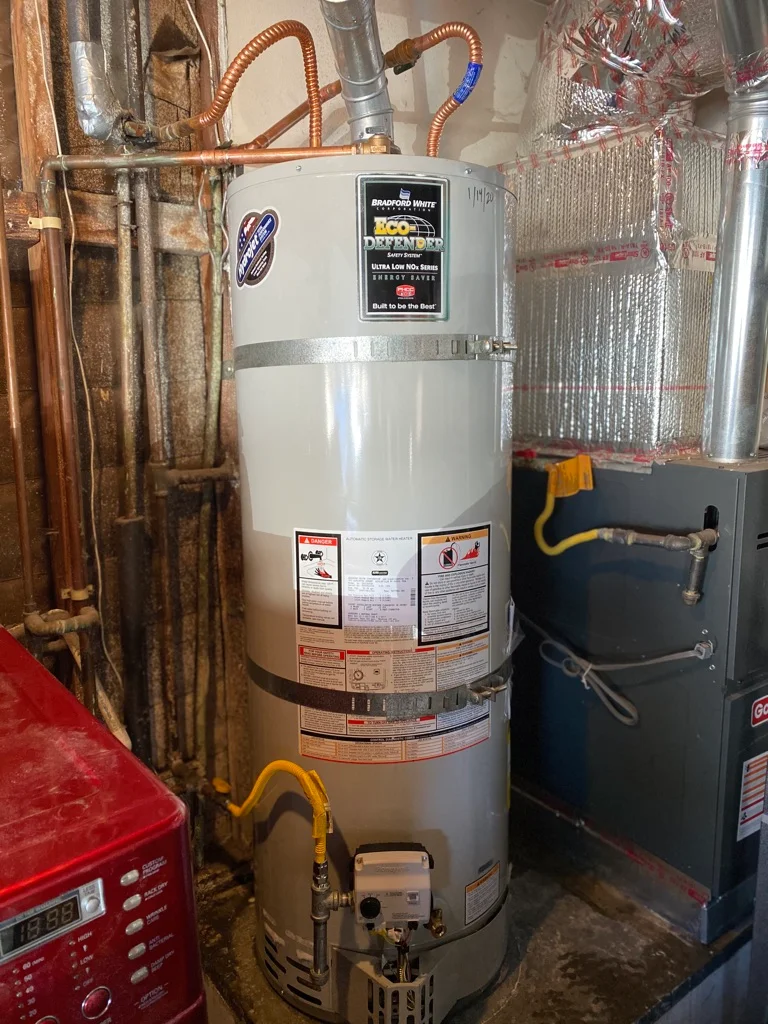A water heater is essential for daily routines—hot showers, clean dishes, and reliable laundry cycles all depend on it. When your system starts leaking, producing inconsistent temperatures, or driving up your energy bill, it’s time to replace it. Waterfront Plumbing responds fast, with 24/7 availability and same-day emergency service on 20–30% of calls. Their team prioritizes quality workmanship and energy-efficient solutions while maintaining a reputation for integrity and honest service. When your water heater needs attention, they get it done right—the first time.
Average Lifespan of a Water Heater
Water heaters are not built to last forever, and understanding their typical lifespan can help you plan for a timely replacement. On average, the longevity of your water heater depends largely on its type:
- Traditional tank water heaters typically last between 8 to 12 years. These units store and continuously heat a set amount of water, which puts regular strain on the tank and its components over time.
- Tankless water heaters, also known as on-demand systems, generally last longer—around 15 to 20 years—because they heat water only when needed and don’t store it, reducing wear and tear.
Several factors can influence how long your water heater lasts:
- Water quality: Hard water, which contains high levels of minerals like calcium and magnesium, can cause scale buildup inside the tank or on heating elements, reducing efficiency and accelerating wear.
- Usage frequency: Households that use more hot water throughout the day tend to wear out their units faster. A family of five, for example, will place much more demand on a water heater than a single-occupant household.
- Maintenance history: Regular maintenance, such as flushing the tank to remove sediment or checking the anode rod for corrosion, can significantly extend the lifespan of your water heater. Neglecting routine care often leads to premature failure.
Understanding both the average lifespan and the variables that affect it allows you to monitor your water heater’s health and plan before you’re left without hot water.
Signs It’s Time to Replace Your Water Heater
Knowing when to replace your water heater can prevent unexpected breakdowns, water damage, and costly energy waste. Several warning signs indicate your unit may be approaching the end of its service life. If you notice any of the following issues, it may be time to consider a replacement, and calling trusted professionals like Waterfront Plumbing can help ensure a smooth, energy-efficient upgrade.
- Inconsistent or insufficient hot water: If your showers are suddenly going cold or it takes a long time for water to heat up, the heating elements or the tank itself could be failing.
- Rust-colored water or metallic taste: Discolored water coming from your hot water tap may suggest internal rusting. This could mean the tank is corroding from the inside and may begin to leak soon.
- Strange noises (popping, rumbling): Sediment buildup at the bottom of the tank can cause the water heater to overheat and produce popping or rumbling sounds. This reduces efficiency and can damage the tank over time.
- Visible leaks or corrosion: Any signs of water pooling around the base or corrosion on the tank are major red flags. Even small leaks can quickly escalate into serious water damage if not addressed promptly.
- Increased energy bills: A declining water heater has to work harder to deliver the same amount of hot water, which often results in noticeably higher utility costs.
- Age of the unit: If your water heater is more than 10 years old (for tank models) or over 15 years old (for tankless models), it’s wise to start considering a replacement, even if it’s still functioning. Aging units are more prone to failure and less efficient than newer models.
Staying alert to the signs of a failing water heater—like inconsistent hot water, rust-colored water, strange noises, visible leaks, rising energy bills, or an aging unit—helps you avoid emergencies and expensive damage. When it’s time for a replacement, Waterfront Plumbing delivers fast, expert service to restore your hot water and ensure long-term efficiency.
Repair vs. Replace: How to Decide
When your water heater starts acting up, the first question many homeowners ask is whether it’s better to repair the unit or replace it altogether. Making the right choice depends on several key factors, including cost, age, and reliability.
- Cost comparison of repair vs. replacement: If the cost of repairing your water heater is more than 50% of the price of a new unit, replacement is usually the better financial decision. Some minor issues, like a faulty thermostat or heating element, are relatively inexpensive to fix, but significant tank damage or frequent part failures can quickly add up.
- Age of the water heater as a decision factor: Older units are less efficient and more prone to problems. If your water heater is approaching or has exceeded its expected lifespan (around 10 years for tank models and 15+ years for tankless), replacement is often the wiser long-term investment.
- Frequency of past repairs: A water heater that has needed multiple repairs in the past few years is likely nearing the end of its service life. Continually investing in fixes can become more costly than simply upgrading to a new, more reliable system.
- Warranty status: Check if your unit is still under warranty. If it is, repairs may be covered, reducing your out-of-pocket costs. Once the warranty expires, any issues are your responsibility, making replacement more appealing if problems persist.
Waterfront Plumbing helps homeowners weigh these factors and offers honest, expert guidance. If replacement makes more sense than repair, they’ll recommend the most efficient option and handle the job quickly, so you don’t have to worry about repeat issues or wasted energy.
Maintenance Tips to Extend the Life of Your Water Heater
Regular maintenance is essential to keeping your water heater running efficiently and extending its lifespan. Simple preventative steps can help you avoid costly repairs and push back the need for a full replacement. Waterfront Plumbing offers expert maintenance services to ensure your system stays in top shape year-round.
- Flush the tank annually to remove sediment: Over time, minerals and debris build up at the bottom of the tank, which can reduce efficiency and cause overheating. Flushing the tank once a year helps remove this sediment and keeps your system running smoothly.
- Inspect and replace the anode rod every few years: The anode rod is a crucial component that prevents the tank from rusting. It attracts corrosive elements in the water, sacrificing itself to protect the tank. Checking and replacing it every 3–5 years can significantly extend the unit’s lifespan.
- Check the pressure relief valve: This safety feature prevents the tank from building up too much pressure. Lift the valve’s lever periodically to make sure it’s functioning properly and not leaking. A faulty pressure relief valve should be replaced immediately to avoid dangerous pressure buildup.
- Adjust the thermostat for efficiency: Setting your water heater’s thermostat to 120°F is typically sufficient for most households. This helps prevent overheating, reduces energy consumption, and minimizes the risk of scalding, while also lowering wear on the unit.
Routine maintenance may seem minor, but it has a major impact on performance and reliability. Waterfront Plumbing can handle these tasks quickly and correctly, giving you peace of mind and helping your water heater run efficiently for years.
Choosing a New Water Heater
When it’s time to replace your old water heater, choosing the right model makes a big difference in comfort, efficiency, and long-term value. Waterfront Plumbing helps homeowners evaluate their options and install systems that match both their hot water needs and budget. With over 25 years of hands-on experience, their team can guide you through the process and ensure a safe, code-compliant setup.
Types of Water Heaters
- Tank vs. tankless: Traditional tank water heaters store a fixed amount of hot water and are typically more affordable upfront, but they use more energy to keep water heated around the clock. Tankless water heaters, on the other hand, heat water only when needed, offering better efficiency and a longer lifespan, though they come with a higher initial cost.
- Electric vs. gas: Electric water heaters are generally easier to install and maintain, and they’re ideal for homes without natural gas access. Gas water heaters tend to heat water faster and may have lower operating costs in areas where natural gas is cheaper than electricity.
- High-efficiency models: Modern high-efficiency water heaters—including ENERGY STAR® certified models—are designed to use less energy without sacrificing performance. They often include advanced insulation, smart controls, or heat pump technology.
Considerations
Before choosing a unit, keep the following factors in mind:
- Household size and hot water needs: Larger families or homes with multiple bathrooms may require a bigger tank or a high-flow tankless system to meet demand.
- Energy efficiency: Look for the unit’s Energy Factor (EF) or Uniform Energy Factor (UEF) rating. Higher numbers indicate better efficiency, which translates to lower monthly utility bills.
- Upfront cost vs. long-term savings: While high-efficiency or tankless systems may cost more initially, they typically offer lower operating costs and a longer lifespan, providing better value over time.
Waterfront Plumbing can evaluate your home’s hot water demands and recommend the right system for long-term comfort and efficiency. Their team ensures fast, professional installation, so you get the performance you need without the hassle.
Professional Inspection and Installation
Replacing or maintaining a water heater requires a licensed plumber. It involves handling gas lines, electrical connections, venting, and water pressure—any mistake can lead to leaks, fire hazards, or water damage. Waterfront Plumbing performs every inspection and installation according to code, ensuring safety and long-term performance.
- Importance of hiring a licensed plumber: A licensed plumber has the training and certifications needed to handle gas lines, electrical connections, venting, and water pressure systems. This minimizes the risk of leaks, water damage, or hazardous conditions like gas leaks or electrical fires. Plus, many manufacturers require professional installation to keep warranties valid.
- What to expect during a water heater inspection: During an inspection, the plumber will check for signs of wear or damage such as corrosion, leaks, sediment buildup, or faulty components. They’ll assess water pressure, test the thermostat and safety valves, and examine venting and connections. An inspection can reveal whether a repair will suffice or if a full replacement is necessary.
- Safe removal and installation practices: The old water heater is fully disconnected, drained, and removed. The new system is installed, hooked up to power or gas lines, and tested for safe operation. Waterfront Plumbing handles the entire process from start to finish with no shortcuts.
Professional installation protects your home and ensures the system performs reliably. Waterfront Plumbing completes every job with precision, preventing future issues and restoring hot water quickly.
Knowing how often to replace a water heater helps you avoid unexpected failures, water damage, and high energy bills. Most units last 8–12 years, but performance issues and visible wear may call for earlier replacement. Regular maintenance and close attention to warning signs can extend your system’s life and improve efficiency. When it’s time for an inspection or new installation, Waterfront Plumbing provides trusted, professional service to keep your hot water running reliably year-round.



